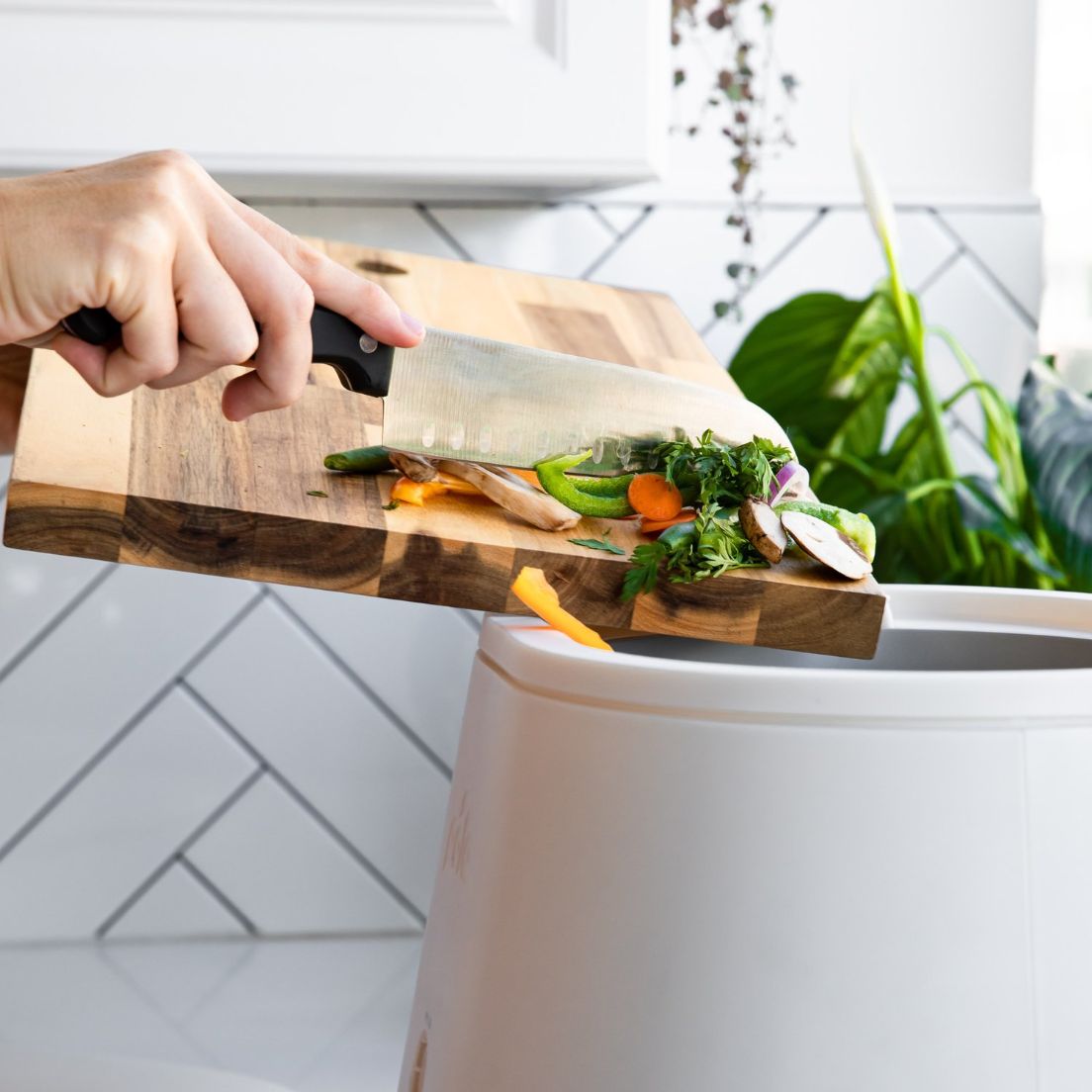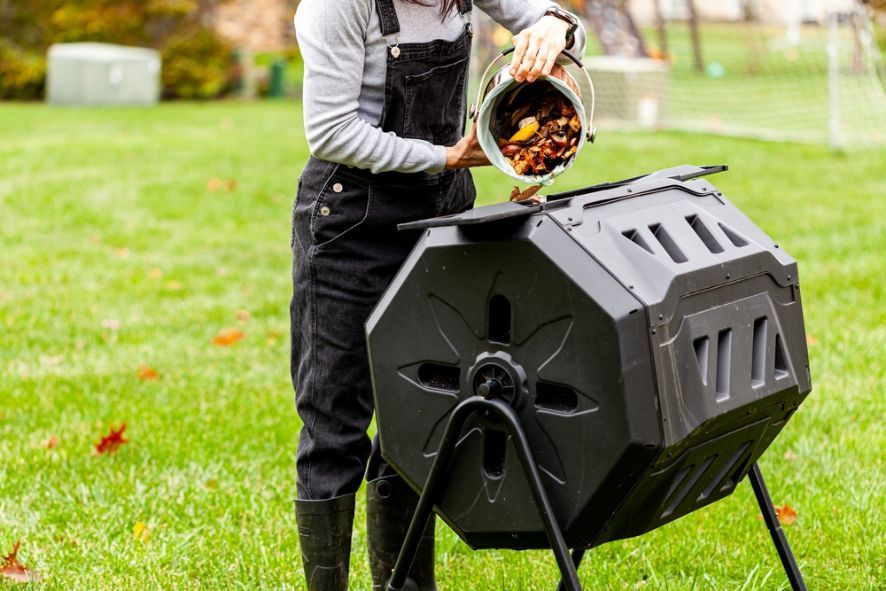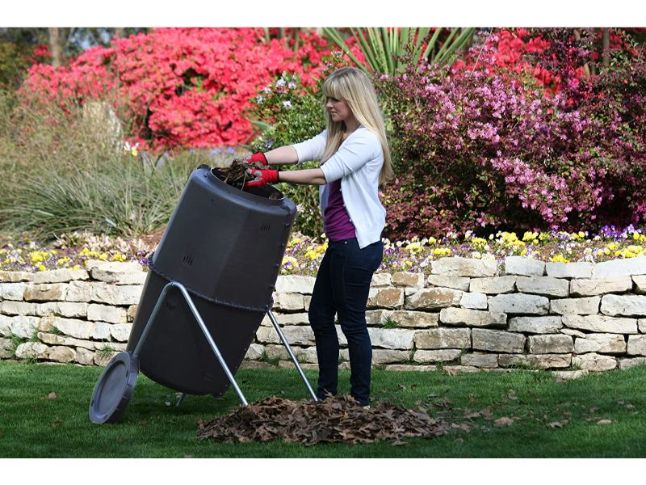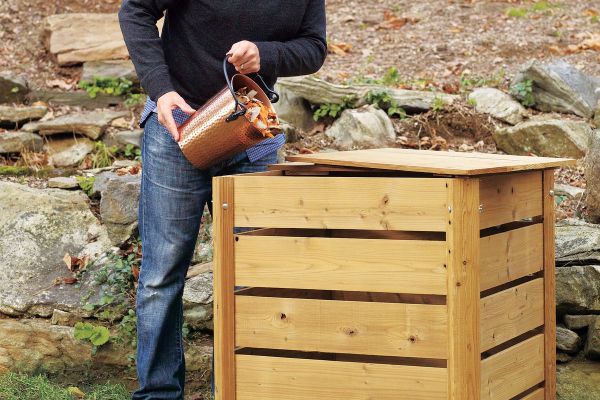
Garden composting is a great way to turn your garden into an organic paradise.
Compost enriches your soil by adding biodegradable materials which reduce the need for commercial fertilizers and promote the production of beneficial organisms like bacteria and fungi that can break down organic matter. While some rely on bags of commercially produced compost for their garden, making your own compost is not only cheaper but can also be more beneficial to the soil.
Not sure where to get started? Jump to the part of the guide that answers your most pressing garden composting question.
- Why use compost in your garden?
- Compost vs fertilizer for the garden: which one is better?
- How to make the best garden compost: 5 easy methods to try
- 5 composters and garden composting equipment every gardener needs
- Top 10 garden composting tips for beginners
- Top FAQs about composting for your garden
This guide will teach you everything you need to know about how to start composting for garden excellence, including why use compost in your garden and how to make the best garden compost.
Looking for some unique gardening gifts? Check out our indoor gardening gift guide here for 20+ great gift ideas!
Why use compost in your garden?

Compost is a natural, organic fertilizer that you can make for your own garden. In fact, every gardening expert says it’s the best thing you can do for your plants and vegetables! Benefits of compost in garden applications include:
- Adding nutrients to the soil slowly: As compost materials break down, they release nutrients slowly over time. These are essential elements for plant growth that become available to plants as needed. Whereas chemical fertilizers release their nutrients all at once and can actually cause plant diseases if not used correctly.
- Improving soil structure: The organic matter in compost helps form soil aggregates by making the particles of soil clump together. This increases the soil’s ability to absorb and use water, particularly if the soil in your area is very sandy.
- Introducing valuable organisms to the soil: Composting also introduces beneficial organisms into the soil, such as bacteria and fungi. These organisms break down organic materials in the compost pile, which releases nutrients for plants and helps improve soil structure.
- Adding nitrogen and sulfur to soil: All plants need nitrogen to grow, and compost is a great source of nitrogen that gets released slowly during the spring and summer. Compost also releases significant amounts of sulfur that plants need to build that chlorophyll that makes photosynthesis possible.
- Retaining moisture in the soil: Compostable materials retain moisture in the soil, which is especially important during hot, dry summers. This can reduce the need for watering your garden and save you time and money.
- Recycling kitchen and yard waste: Direct garden composting is a great way to reduce your carbon footprint. By composting your food scraps and yard waste, you can recycle it back into the soil to help nourish your garden or potted plants.
- Reducing landfill waste: Utilizing compost from your food scraps and yard waste will reduce the amount of waste being sent to landfills. This is good for the environment because it reduces the harmful methane gas emissions that come from decomposing organic materials in landfills.
Compost vs fertilizer for the garden: which one is better?

Utilizing compost in your garden can be beneficial if you’re trying to promote deep root growth or if you have plants that are sensitive to quick changes in soil nutrients. Fertilizers, on the other hand, can be a good option if you’re looking for a quick boost of nutrients for your plants.
When deciding on compost vs fertilizer for garden health, you should choose compost if you are organic gardening. Additionally, compost is a natural slow-release fertilizer, which means that the nutrients it provides are available to plants over time. Chemical fertilizers, on the other hand, release their nutrients all at once.
Ultimately, the best fertilizer for your garden is the one that best meets your needs and the needs of your plants.
How to make the best garden compost: 5 easy methods to try
Want to start composting but not sure which method to try? You’ve got options!
1. Electric composter

Electric composters, like Lomi, are a great option for small gardens or if you have limited space. These composters work by breaking down organic matter with the help of bacteria and fungi. Electric composters typically have a capacity of 0.5 to 1 gallon, so they’re perfect for indoor apartment composting.
What's great about electric composters is that they can be placed indoors and out of the way. This is a great option if you live in an area with cold winters, as you can compost all year round.
Why use this method: One advantage of using an electric composter is that it will speed up the decomposition process. This is because the electric composter will generate heat, which helps to break down the organic matter more quickly.
Pro Tip: The nutrient-rich dirt that Lomi creates in Grow mode can be used in your garden in a 1:10 ratio with other soil.

2. Compost bin

If you want a more traditional option, then a compost bin is a good choice. They can be placed in your garden or your backyard. What's great about compost bins is that they come with a lid, which prevents heat from escaping and helps to keep the composting process going strong.
Why use this method: Compost bins are a great option because they are very easy to use. Simply add your organic waste to the bin and leave it to compost. The bin will keep the compost contained, so you can use it at your leisure while keeping it out of sight.
Pro Tip: If you are using a compost bin, make sure that you turn the compost regularly. This will help keep your compost aerated, which is important for the composting process to be successful.
3. Compost tumbler

If you want to compost in a short time frame, then a compost tumbler is a great option. Compost tumblers speed up the composting process by making it easy to keep your pile turned and aerated.
Compost tumblers are very simple to use, all you have to do is add your garden waste to the tumbler and then turn it periodically.
Why use this method: One advantage of using a compost tumbler is that it will speed up the composting process. This is because the tumbler will help to aerate the compost, which helps to break down the organic matter more quickly.
Pro Tip: If you are using a compost tumbler, make sure that you add the right proportion of organic matter. You should add one part green materials to thirty parts brown materials. This will help to create the perfect balance for your finished compost.
4. Compost pile

A compost pile is a great choice if you have the space for it and if you produce a lot of organic waste. This is the most traditional method of composting and it is also the most simple. All you need is a spot in your garden where you can build a pile of organic waste.
Why use this method: The main advantage of using a compost pile is that it is very easy to do. All you have to do is find a spot in your garden and simply add your organic waste to the compost pile then leave it to decompose.
Pro Tip: If you are thinking of using a compost pile, make sure that you find a spot in your garden that gets plenty of sunlight. This will help to speed up the composting process.
5. Compost bag

If you don't have the space for a compost pile or bin, then a compost bag is a great alternative. What's also great about compost bags is that you can use a regular trash bag, which is inexpensive and easy to buy.
Why use this method: The main advantage of using a compost bag is that it is very cheap and convenient. Just put your organic waste in the bag and then close the drawstring. The bag will keep the composting process going strong, and you don’t have to worry about mixing or turning the compost inside.
Pro Tip: Composting in a trash bag is easiest to do with fallen leaves collected in the fall. Because the compost will be made over the colder months of winter, it may take longer due to lack of heat.
5 composters and garden composting equipment every gardener needs
Composting is a great way to reduce waste and save money for your garden. If you want to compost at home, there are great tools available to get started.
1. Lomi

Lomi is a composting machine that uses heat and agitation to speed up the composting process. This composting tool is made from recycled plastic, is easy to use, and fits right on your countertop.
Lomi easily biodegrades food and organic waste into nutrient-rich dirt. Just add green or brown materials and Lomi will take care of the rest. If you don’t create a large amount of food waste, Lomi is the best composter for small garden owners.
Learn more about the Lomi and reserve your unit here!
Price: $499
Why you need it: Lomi’s sleek look and small profile make it a chic addition to your kitchen counter, which is much more convenient than walking to the backyard to compost.
2. Miracle-Gro®

The 37-gallon Miracle-Gro® Dual Chamber Tumbling Composter has two chambers, which allows you to have compost constantly ready to use. While your first batch of compost is finishing up, start a second one so you will always have a steady stream of compost to put in the garden.
Price: $110
Why you need it: This tumbling composter is easier than ever to rotate, no pitchfork required.
3. Spin Bin Compost Tumbler

The Spin Bin Compost Tumbler is your friend if you're looking for the best compost bin for large garden spaces. It has a capacity of 60 gallons, so it is a great option if you produce a substantial amount of waste material. With the Spin Bin Compost Tumbler, you'll be able to compost large amounts of material quickly and easily.
Price: $180
Why you need it: The rotating drum makes it easy to mix the compost, while the aeration system helps to speed up the composting process.
4. Worm Factory Composter

This worm composting system uses worms like red wigglers to break down organic material. It is the best small garden composter to make compost without needing tons of space. The Worm Factory Composter is easy to use and requires no electricity. It is also a child-safe, odor-free, and eco-friendly composting system
Price: $130
Why you need it: Perfect for odor-free composting in a small space.
4. Cedar

Cedar compost bins contain natural oils that prevent rot and serve as a natural insect repellent. Cedar wood is a natural, sustainable material that is quite sturdy. Cedar compost bins will last approximately 10 years. Plus, the removable slats make turning your pile quick and easy.
Price: $269
Why you need it: Cedar is a natural and sturdy material if you’re interested in non-plastic sustainable composting bins and organic gardening.
Top 10 garden composting tips for beginners

Garden composting for beginners doesn’t have to be complicated. We’ve compiled some helpful beginner-friendly tips if you’re wondering how to make the best compost for vegetable garden amendment.
- Find the right balance: Be sure your compost has the right balance of green and brown composting materials. Greens such as grass clippings, vegetable scraps, or coffee grounds, provide nitrogen. Browns like fallen leaves, straw, sawdust and paper, provide carbon.
- Mix and turn frequently: Turn your pile regularly to aerate it and speed up the decomposition process. A pitchfork or compost tumbler work well for this task.
- Make sure your bin is accessible: If you have seasonal concerns, like snow or heavy rain, it’s good to have a place where you can store your compost bin safely away from Mother Nature and accessible to add food scraps during bad weather.
- Check the temperature: If you have a compost pile keep an eye on the temperature – it should be warm to the touch but not hot. Temperatures that are too high will kill the beneficial bacteria that are helping to break down the organic matter.
- Try an electric composter: If you're put off by the effort, maintenance, or space requirements of traditional backyard composting methods, try using a countertop electric composter like Lomi.
- Don't use your compost too early: When your compost is ready, it will be dark brown in color and have a crumbly texture.
- Use your compost indoors: While you can use compost to amend your soil or mulch around your plants, it's also an excellent addition to indoor or potted plants.
- Be careful what you compost: Don’t add meat, dairy, or oily foods to your compost pile as they can attract pests and create unpleasant odors.
- Give worms a try: If you live in an urban area, you may want to consider getting a worm bin for indoor composting. Worms are great at breaking down organic matter quickly and efficiently.
- Practice patience: Composting takes time and a bit of effort, but the benefits are well worth it. Not only does composting help to improve the quality of your soil, but it also reduces the amount of waste that goes to landfill.
Top FAQs about composting for your garden

While we’ve discussed almost everything you need to know about composting for your garden, there might still be a few questions on your mind. Here are some common questions about garden composting.
1. What is the best way to add compost to garden?
The optimal way to add compost to your garden is by adding 4 to 6 inches of compost on top of the soil and mixing it in using a tiller. This will help evenly distribute the compost throughout the soil surface. You can also add compost to the garden by hand or spread it around the plants with a garden fork or trowel.
It may take a while to distribute it evenly if plants are already in the ground. You can also mix it into the top layer of soil before planting new crops and have the best homemade compost for your vegetable garden.
2. When is the best time to add compost to a garden?
You can add compost to the garden at any time of year, but the best time to add compost to garden soil is in the fall. This is because the soil is still warm from the summer months and this will give the compost enough time to break down before the growing season begins.
If you live in an area with a lot of rain, you may want to wait to add compost until the spring. This is because the rain can wash away the nutrients in the compost if it is added too early.
3. What is the best type of compost for vegetable garden?

Manure is the best compost to add to vegetable garden soil. It contains a lot of organic matter and high nitrogen levels, which are essential for plant growth. You can use other types of compost such as compost made from kitchen scraps, but it may take some effort to balance the carbon to nitrogen ratio to be ideal for your vegetable garden.
Also, composting directly in the garden is possible with manure-based compost. However, you can’t add fruit and vegetable scraps directly to your garden as they need to be mixed with carbon rich materials and heated to break down into nutrient-rich dirt. Additionally, you should never add food scraps such as meat or dairy products to your compost pile, as these can attract pests and cause unwanted odors.
4. What is the right ratio of carbon to nitrogen for my compost?
The ideal carbon to nitrogen ratio for compost is 30:1. This means that for every 30 parts carbon, you should have 1 part nitrogen. You can achieve this ratio by using materials like hay or straw for your compost pile. If you are composting food scraps, you may not need to add any additional nitrogen.
5. What organic materials can I compost?
There are a host of organic materials in your yard and home that are suitable for the compost pile.
- Fruit and vegetable kitchen scraps: including peelings and cores
- Eggshells: an excellent source of calcium
- Coffee grounds: nitrogen- rich and deter slugs and snails
- Houseplant clippings: stems and leaves from indoor plants
- Yard waste: dried leaves, twigs, wood chips, and sawdust
- Garden waste: stems and leaves from pruning
- Animal manure: chicken and grain-fed livestock manure
6. What things should I not compost?
Some organic matter doesn't belong in the compost pile. Avoid adding the following food scraps to your compost heap.
- Meats, poultry, fish and bones: attract pests and generate odors
- Dairy products: similar issues to meats
- Pet manure: domestic pet manure can carry diseases and parasites
- Acidic foods: tomatoes, citrus, onions, and garlic can harm beneficial bacteria and earthworms
For a more comprehensive list of items that can and cannot be composted, check out this guide.
As you can see, there are many ways to compost for your garden. Whether you’re a beginner or an experienced gardener, there’s a composting method that will work for you.
For easy and convenient composting, Lomi is our go-to composter of choice. Get Lomi today to skip the trial and error of finding the perfect composting method for your needs. It is a tried-and-true tool that will get you the best results every time.
Written by: Rebecca Neubauer
